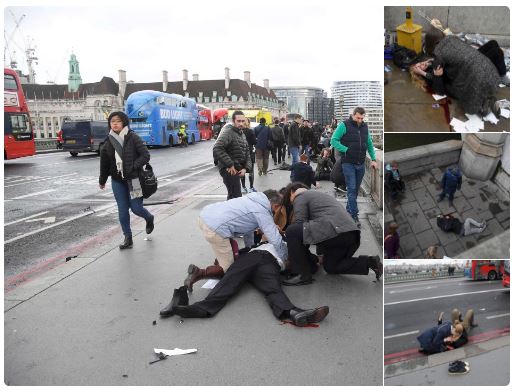Is one month too many……
A Month of Islam and Multiculturalism in Britain: March 2017
by Soeren Kern
//www.gatestoneinstitute.org/10215/islam-multiculturalism-britain-march
- “Have you seen some of those ISIS propaganda videos, they are cut like action movies. Where is the counter narrative?” — Riz Ahmed, actor.
- Britain’s foreign aid budget is reportedly funding at least two dozen Palestinian schools, some of which are named after terrorists and murderers and which openly promote terrorism and encourage pupils to see child killers as role models.
- An estimated 400 home-grown jihadis have returned to the United Kingdom after fighting in Syria, but only 54 of those have been prosecuted, according to a Mail on Sunday investigation, which also discovered that some returned jihadis are roaming free on the streets of Britain.
March 1. A new Channel 4 documentary series called “Extremely British Muslims” showed the inner workings of a sharia court inside Birmingham’s Central Mosque. In the first episode, viewers witnessed the case of mother-of-four Fatima, 33, as she sought permission to divorce her drug dealer husband she says has abused her throughout their 14-year marriage. According to sharia law, Muslim women must plead their divorce cases in court, while Muslim men need only to say the words “I divorce you” three times to obtain a divorce. Birmingham Central Mosque said it allowed the sharia proceedings to be filmed in an effort to “break down misconceptions about Islam.” Some 100 sharia courts in Britain are now dispensing Islamic justice outside the remit of the British legal system.
March 2. English actor Riz Ahmed warned that the lack of Muslim faces on British television was alienating young people, driving them towards extremism and into the arms of the Islamic State. Delivering Channel 4’s annual diversity lecture in Parliament, Ahmed said that television had a pivotal role to play in ensuring that Muslims felt heard, and valued, in British society:
“If we fail to represent, we are in danger of losing people to extremism. In the mind of the ISIS recruit, he’s the next James Bond right? Have you seen some of those ISIS propaganda videos, they are cut like action movies. Where is the counter narrative? Where are we telling these kids they can be heroes in our stories — that they are valued? If we don’t step up and tell a representative story we are going to start losing British teenagers to the story that the next chapter in their lives is written with ISIS in Syria.”

